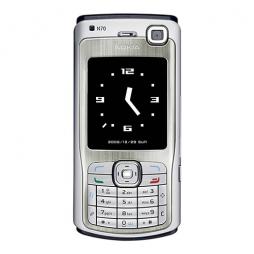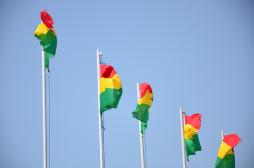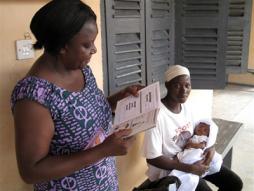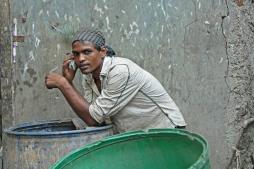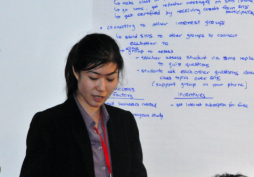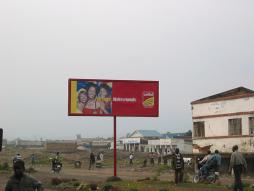research
Posted by AnneryanHeatwole on Dec 12, 2011
Scaling Up Mobile Health: Elements Necessary for the Successful Scale Up of mHealth in Developing Countries data sheet 540 Views
Abstract:
The use of mobile phones to improve the quality of care and enhance efficiency of service delivery within healthcare systems is known as mobile health, or mHealth, and is a sub-segment of the broader field of electronic health (eHealth). WHO has defined mHealth as the “provision of health services and information via mobile technologies such as mobile phones and Personal Digital Assistants (PDAs).” mHealth tools have shown promise in providing greater access to healthcare to populations in developing countries, as well as creating cost efficiencies and improving the capacity of health systems to provide quality healthcare.
Recent evidence from randomized scientific trials and studies has demonstrated that the capabilities of mobile phone technology, particularly SMS messaging, can positively impact treatment outcomes. Results of the WelTel Kenya1 clinical trial, the first study of its kind in Africa, were published in The Lancet in November of 2010. The trial focused on the impact of SMS messaging on HIV-infected adults starting antiretroviral therapy (ART) in three clinics in Kenya. The study showed that patients who received SMS support had significantly higher adherence to ART and higher rates of viral suppression when compared with patients in the control group. A scale up of such a mobile phone support system in Kenya could suppress viral loads in 26,000 extra people at the cost of less than USD 8 per person per year, according to Richard Lester of the British Columbia Centre for Disease Control and the study’s lead researcher. Another cluster-randomized trial at 107 rural facilities in Kenya found that SMS message reminders sent to health workers’ mobile phones improved and maintained their adherence to treatment guidelines for outpatient pediatric malaria in Kenya.
A multitude of mHealth solutions have emerged over the years in countries such as Ethiopia, Kenya, Nigeria and South Africa, which are leading the way in using mobile health services, according to the Global Observatory for eHealth at the WHO. Getachew Sahlu of the WHO identified the convergence of the following factors as the driving force behind the current rapid mHealth growth in developing countries: (1) a record growth of mobile phone users, (2) rapid expansion of mobile networks, (3) the decline in mobile phone costs, and (4) the innovation in mobile technology. The mobile platform presents the unique capability of delivering healthcare services wherever people are—not just in healthcare facilities. mHealth initiatives have also been effective in reaching underserved populations, particularly those in rural areas, changing health behaviors and outcomes, and addressing a wide variety of healthcare challenges, including:
• The shortage of skilled healthcare workers in certain developing country settings
• Treatment adherence and compliance
• Lack of timely and actionable disease surveillance
• Poor drug inventory and supply chain management
• Use of counterfeit drugs
• Lack of medical diagnostic treatment
• Slow rates of information flow and reporting delays.
mHealth represents a cost-effective technology solution to many of these challenges if implemented correctly and brought to scale. The costs of mobile handsets and usage are declining as demand for mobile services increases and mobile networks are being rapidly expanded.
Posted by AnneryanHeatwole on Oct 25, 2011
Following this weekend's Tunisian elections, the world is looking to the Middle East to see how new democracies are born. But in many countries with emerging democracies, fraud and corruption can taint the credibility of elections, and the public's trust in the fairness and validity of election results. We have long argued that technology - mobile technology in particular - can play a key role in helping to ensure fair and accurate voting processes and results. However, data has been missing to make that point more definitively.
In areas where much of the voting process isn't digitized, using technology can help mitigate vote tampering and incorrect results. Additionally, SMS reports of vote tabulation from polling stations by trained election observers can be an effective way of limiting voting fraud and corruption, and has been used in different elections around the world. In Lebanon's 2009 elections, roughly 2500 volunteer citizen observers reported from a statistically significant number of polling station incidence reports throughout election day. In Nigeria, 2011 Project Swift Count deployed 8000 trained election observers across the country to report on the elections, including election results from polling stations directly, using SMS.
| Tech in Election Monitoring: Fighting Fraud and Corruption, one Picture at a Time data sheet 1976 Views |
| Countries: |
Afghanistan
|
Posted by AnneryanHeatwole on Oct 03, 2011
Today's Mobile Minute brings you coverage on the future of QR codes in the upcoming U.S. elections, a GSMA study on the effects of cutting mobile taxes in Africa, a look at how Americans prefer to use their mobile phones, the growth of mobile money transfers in Uganda and the world, and a roundup of whom to follow on Twitter for ICT4D and M4D news.
- Mashable investigates how QR codes could be used in the upcoming 2012 U.S. elections. Ideas include organizing field operations, soliciting donations, encouraging celebrity endorsements, cross-promoting the election through merchandise sales and social media, and using QR codes to reach out to new voting blocks during get out the vote drives.
- The GSMA recently released their preliminary findings from research on mobile phone taxation in Africa. The research is still ongoing, and will have a global focus when the final results are released, but the information from Africa shows how lower taxes on handsets can lead to an increase in mobile ownership – in Kenya, after the value added tax on handsets was cut by 16%, sales increased by 200%.
- CNN reports that the popularity of SMSs as the primary means of mobile communication in the United States is rising, while voice call preference is dropping. From a study from the Pew Internet and American Life Project, 53% of Americans still prefer voice calls to SMS, while 31% prefer SMS to calls, and 14% said their preference was flexible depending on the situation. The study also found that 27% of mobile owners never use SMS, so voice is still the leading way to communicate via mobile in the US despite the growing popularity of SMS (only 4% of survey respondents said they only use their phones for SMS and never voice calls).
- In Uganda, mobile payments and mobile money transfers are taking off. According to Business Week, Ugandan telecom MTN reported that they passed more than $200 million in mobile money in August 2011. In related news, The Times of India reported on a new projection from the Ernst & Young consultant firm that estimates that by 2014, roughly $245 billion will be transfered via mobile payments systems worldwide.
- Interested in global development and want to learn more through Twitter? The Guardian has a roundup of twenty Twitter users who tweet about global development, ICT4D, M4D, global change, and good aid practices. If you're looking to follow some new people on Twitter, this is a good start.
[Mobile Minute Disclaimer: The Mobile Minute is a quick round-up of interesting stories that have come across our RSS and Twitter feeds to keep you informed of the rapid pace of innovation. Read them and enjoy them, but know that we have not deeply investigated these news items. For more in-depth information about the ever-growing field of mobile tech for social change, check out our blog posts, white papers and research, how-tos, and case studies.]
Image courtesy Flickr user QiFei
Posted by AnneryanHeatwole on Sep 30, 2011
ICT4D and M4D projects often focus on how mobiles can be used in developing countries, but the success and usefulness of these projects depends on the value mobile users place on their phones, and how they use them. "We Use It Different, Different: Making Sense of Trends in Mobile Use in Ghana," looks at how Ghanians use mobile phones in their day-to-day lives, mainly focusing on why survey participants started using a mobile phone, how they use it, and how they view the value of mobile phone ownership.
| Featured Research: Making Sense of Mobile Phone Use in Ghana data sheet 1951 Views |
| Countries: |
Ghana
|
Posted by AnneryanHeatwole on Sep 20, 2011
A research study on the role of mobile phones in the slums (favelas) of Rio de Janeiro investigates the power structures of how mobile phones influence social interactions and values among favela residents. Written by Adriana de Souza e Silva, Daniel M. Sutko, Fernando A. Salis, and Claudio de Souze e Silva, "Mobile Phone Appropriation in the Favelas of Rio de Janeiro, Brazil" offers a new perspective on the role of mobile phones in low-income areas. The authors point out that Brazil is in a unique position as it has both high-income and low-income residents living in very close proximity. They say:
Studies of developing countries often exclude Brazil because the country is considered an upper-middle income economy by the World Bank (Donner, 2008), but this classification ignores Brazil’s extremely uneven income distribution (UDNP, 2008), which results in roughly 10 percent of the population earning 46 percent of the overall income, while 50 percent makes only 13.3 percent (IPEA, 2005: 52). Despite this income distribution, there are about 203 million cell phones in Brazil (as of December 2010), making Brazil the fifth largest country worldwide in terms of cell phone absolute numbers, with a 104 percent cell phone penetration rate (Teleco, 2011).
The study's focus on favela residents looks at how mobile phones play a role in both low- and high-income populations.
The study brought together 15 residents from three different Rio de Janeiro favelas (Jardim America, Vidigal, and Mangueira) to discuss how they use mobile phones and how mobile phones are viewed in their communities. The authors highlighted that favela residents live off-the-grid in Brazil; they do not pay taxes and do not receive social services like electiricity, water, or landline phone services. Because the government does not provide infrastructure for the residents, a "parallel" market has sprung up in which favela residents appropriate services from higher-income neighborhoods and redirect them to the favelas. The authors report:
Because favela residents are precluded from corporately legitimized cell phone ownership, they have developed illegal yet easy means for procuring phones while legally avoiding the cost of service and subverting service providers. The clearest example of illegal procurement is the existence of the parallel market: not one interviewee purchased a phone in a store. Phones were either received as presents or purchased from someone in the favela.
The researchers also found that despite Brazil's high phone penetration rate (104%), most of the respondents shared phones among friends and family members. The study participants all indicated that obtaining mobile phones legally was very difficult due to three main barriers: finances, comfort with technology, and difficulty of ownership. The respondents reported that buying a new phone from a legitimate store was out of their price range, signing up for payment plans required a high level of technological savvy, and that the frequent threat of phone theft meant that holding on to a phone in the favelas was difficult.
The paper also researches "diretão," a system of defrauding service providers (which is especially popular among favela drug dealers as it allows them to communicate for free and off-the-grid):
Diretão, as explained by the interviewees, is a phone illegally provided by service provider employees with a special SIM card that allows the user to freely call anywhere in the world for three months. The catch is that, for each individual call, after ten minutes, cell position can be triangulated by the provider, which results in disabling the diretão, and possibly capturing the service thief.
The study is an interesting look at how mobile phones play a role in favelas, and how low-income populations adapt mobile phones to fit into their communities.
| Featured Research: Mobile Phone Appropriation in the Favelas of Rio de Janeiro, Brazil data sheet 2914 Views |
| Countries: |
Brazil
|
Posted by VivianOnano on Jul 26, 2011
The Case of the Interdisciplinary Researcher: Using Mixed Methods to Observe ICT in Healthcare in Uganda data sheet 1401 Views
Abstract:
While researchers are often depicted as either ‘social scientists’ or ‘technologists’ often their educational and ideological backgrounds are much richer than the two simple terms might imply.
This paper describes the methodology and approach of a qualitative researcher with a computer science background in investigating how information technology changes communications and information management practices within the health ecosystem constitutued by a health subsidy program in southwest Uganda.
Posted by AnneryanHeatwole on May 03, 2011
The Grameen Foundation
recently released an in-depth report on the
state of MoTeCH, a multi-part project that uses mobile technology to
send pre- and post-natal health information to Ghanaians and allows
community health workers to collect and share health data. Launched in
July 2010 in the Upper East Region of Ghana, the system rolled out
the next phase of the pilot in April 2011 in the Awutu
Senya distract in the Central Region of Ghana. The report, "Mobile
Technology for Community Health in Ghana: What It Is and What
Grameen Foundation Has Learned So Far," takes an honest look at the
progress and challenges the organization has faced while implementing a
long-term, large-scale mHealth project.
Mobile Midwife
| New Research! How MoTeCH Uses Mobiles for Maternal Health in Ghana data sheet 2945 Views |
| Countries: |
Ghana
|
Posted by MohiniBhavsar on Jul 28, 2010
India is a country of villages, with over 70% of its population living in rural areas. For mobile operators, this means future mobile subscribers in the country are going to come from India’s villages.
Between 2002 and 2006, mobile penetration increased by a more than 40% in India (source ITU). Still, rural penetration is low, making up just over one fifth of the total mobile user base in India, as reported by the Telecom Regulatory Authority of India in 2007. The future of the mobile industry is exanding in rural India, but what do mobile operators need to do to tap into this market?
In 2009, Accenture, a global management consulting company, surveyed 2,400 current and potential rural consumers and interviewed 15 senior-level executives representing the mobile telephony ecosystem. The goal was to understand the needs of rural customers for mobile services and identify the value propositions for rural services by mobile operators.
| What Mobile Operators in India Have to Do for Useful Rural Expansion data sheet 4265 Views |
| Countries: |
India
|
Posted by PrabhasPokharel on Jun 15, 2010
The Mobile Phone and the Public Sphere data sheet 4775 Views
Abstract:
This article seeks to explore the influence of the mobile phone on the public sphere, in particular with regard to its effect on news agendas, gatekeepers and primary definers. Using the examples of the Chinese SARS outbreak (2003), the south-east Asian tsunami (December 2004), and the London bombings (July 2005), the author questions the extent to which the mobile phone is challenging conventional and official sources of information.
At times of national and personal calamity, mobile phone is used to document and report events from eyewitnesses and those closely involved. Using multimedia messages (MMS) or text messages (SMS) to communities of friends and families, as well as audio phone calls, mobile phone users may precede and scoop official sources and thwart censorship and news blackouts. They can also provide valuable evidence of what actually occurred. Users are able to take pictures and short films and transmit these rapidly to others along with reports of what is happening where they are; they are also able to access other media broadcasts and the internet. They are what have become known as `citizen journalists'.
The evidence suggests that mobile phone usage is contributing to the public sphere and in some instances is circumventing official repression or inadequate information. There is also an indication that the `mobcam' is capturing images that would otherwise be lost. However, the mainstream media has been quick to take advantage of this citizen journalism and mediate it within its own parameters.
Posted by KatrinVerclas on Oct 08, 2009
As part of our 'deconstructing mobile' series, we have been looking closely at the claims that have been made about mobile technology for a more realistic assessment of mobiles in social development that is based on data, rather than hype. Unlike more recent reporting on the topic, the Financial Times has an interesting article that questions whether mobile tech can actually "fill the gap left by underdeveloped healthcare system,' particularly in Africa.
As has been reported, the challenges in delivering health care in many African countries are stark. As the Financial Times points, out, there is 'an acute shortage of resources and trained staff means that more than 50 percent of the region’s population is estimated to lack access to modern healthcare facilities."
Posted by HeatherCole-Lewis on May 04, 2009
Midway through last week’s Mobile Tech 4 Social Change BarCamp in Washington DC, my fellow public health student, Ada Kwan, and I were inspired to propose a session on the role of academic research in the current mobile movement – a topic of many of our personal conversations.
Among the participants were representatives from academia (including but not limited to public health, computer science, information technology, and political science), industry, NGOs, funding agencies, and government. The session sparked very constructive dialogue that I would like to share.
As the session unfolded, the complexity of this idea quickly became evident. The original question—what is the role of academic research in mobiles for social change— opened the floodgates for more difficult questions:
Posted by fredericknoronha on Sep 09, 2008
This conference might be of interest to the Mobile Active community! September 22, 2008 is the last date for submission of papers for the 3rd IEEE/ACM International Conference on Information and Communication Technologies and Development (ICTD2009).
ICTD2009 will be be held in Doha, capital of the small, oil-rich country of Qatar along the Arabian Gulf. This conference is a focal point for new scholarship in the field of ICT and international development. Confirmed speakers include a keynote by Bill Gates, Chairman of Microsoft Corporation.
Conference Co-chair Richard Heeks notes: "As noted previously, we will particularly welcome papers about mobiles and development."
Instructions for submissions of paper are here.
Posted by drenched85 on Aug 27, 2008
Strengthening ICT4D Research Capacity in Asia (SIRCA) Programme is announcing a call for grant proposals.
The SIRCA Programme seeks to identify research leaders, and to facilitate their development through the support of research grants. The awards are focused in the area of Information and Communications Technology for Development (ICT4D or ICTD) in Asia. There are three (3) categories of funding – 20,000 Singapore Dollars (SGD), 26,500 SGD and 33,000 SGD. Project proposals exceeding 33,000 SGD must specify the source of additional funds.
The program is seeking emerging researchers based in Asia who are relatively new to ICTD research and interested in undertaking theoretically-based and methodologically rigorous research. Additionally, applicants need to indicate how they benefit from concerted capacity building exercises, including a mentorship arrangement.
Posted by fredericknoronha on Aug 27, 2008
A new study from the University of Manchester argues that conflict is benefitial to mobile infrastructure investments. These investments have long thought to be dependent on 'pillars' like security and stability, finance and infrastructure, workers and labour markets, and the regulatory framework and tax. "Overarching all of these, the view is that good, stable governance forms the crucial basis for investment," write Agnieszka Konkel and Richard Heeks from the University of Manchester in the UK.
Posted by CorinneRamey on Jun 05, 2008
A new report, Perceived economic benefits of telecom access at the Bottom of the Pyramid in emerging Asia, takes a new look at the effect of mobile phones on the lives of people at the so-called 'bottom of the pyramid.' The report, published by LIRNEasia, states that although anecdotal evidence shows that mobile phones are economically beneficial to base-of-the-pyramid users, there is little empirical evidence to reinforce this claim. The authors conducted a study on mobile phone usage in five Asian countries and used the results to analyze the benefits -- economic and otherwise -- of mobiles on users at the bottom of the pyramid.
There is a plethora of small studies and anecdotal evidence that show the economic impact of mobile phones on small groups or communities of users, such as studies of fisherman in Porto da Manga, Brazil, and Moree, Ghana.
Posted by KatrinVerclas on Mar 29, 2008
Erik Hersman, our excellent colleague and friend over at White African writes about a new mobile data collection tool for Africa focused right now on survey and field data capture. His review is reposted here with permission. Great stuff, thanks, Erik!
I was contacted about a month ago by Mark Fowles who works at Clyral, a web and mobile development company based in Hillcrest, outside Durban, in South Africa. He was emailing me to let me know about a new mobile data collection platform called Populi.net.
